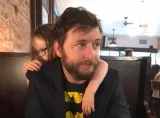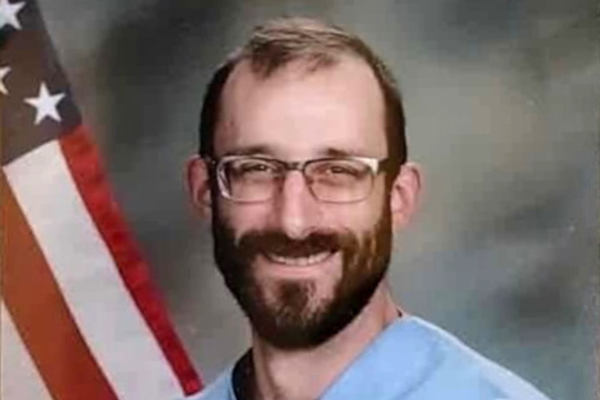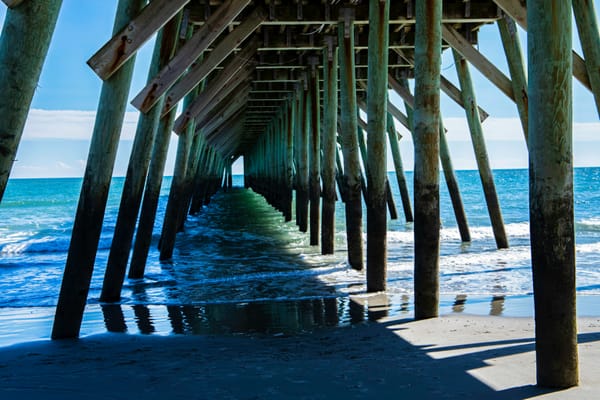Liberals think Democrats aren't pushing back hard enough. Is NC's Anderson Clayton the answer?
There is a line of thought that Democrats don't have guts. North Carolina's fiery liberal leader wants to change all that.
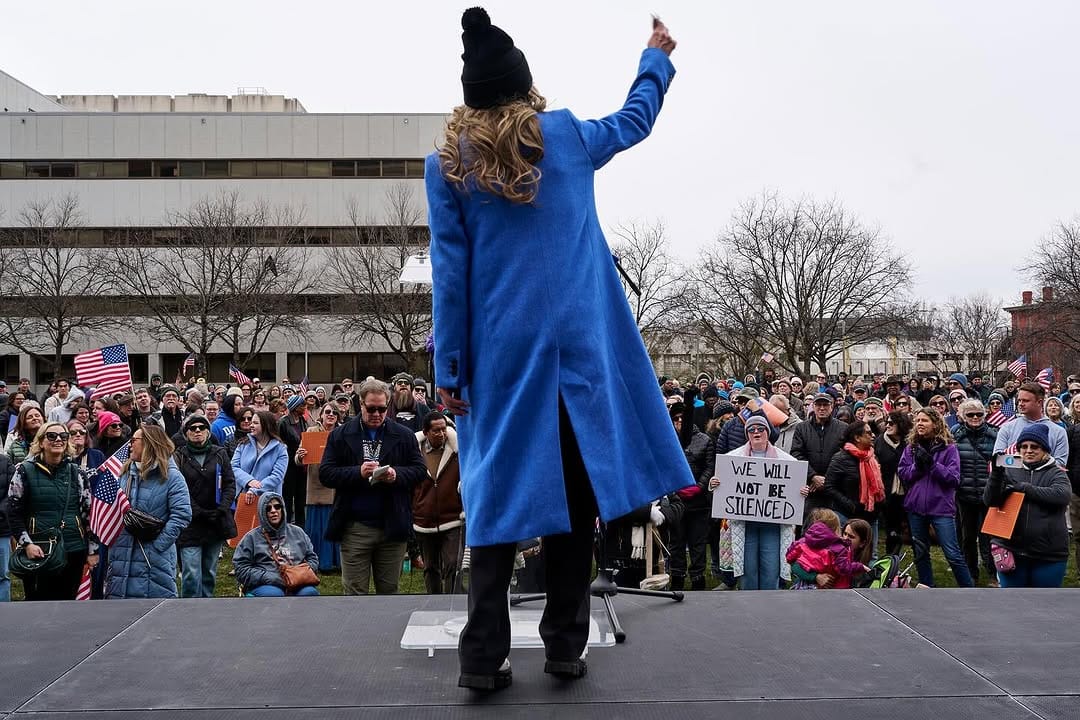
During the 2024 Democratic National Convention roll call, over the opening strains of "Raise Up" — a 2001 rap song about North Carolina that, at its core, is about loving who you are and where you're from — Anderson Clayton made herself known to America.
At national party conventions, the roll call is when state delegates formally throw their support to the party's nominee for president. It can be boring, like a teacher doing attendance.
Clayton treated it like a hip hop hype man or a preacher, name-checking North Carolina natives like Nina Simone, who's known worldwide for her music, and former NC Gov. Jim Hunt, who's known regionally for extolling a robust public education system.
"We represent a new South," Clayton shouted.
In the South, some people's accents are like the sounds of a stringed instrument. Each word, each note, beginning like it's written but bending and elongating as the strings vibrate. It's like words are a destination and some Southerners, to get there, take the scenic route.
Such is Clayton's accent. Everybody who's from here, including me, heard her and knew where she was from.
The "New South" is a complicated term though. It was popularized after the Civil War by white business leaders who wanted to move on, having lost a war and the engine of their economy, which sustained itself on the free labor of enslaved people.
"The old South rested everything on slavery and agriculture," the Atlanta journalist Henry Grady told a banquet in New York in 1886, "unconscious that these could neither give nor maintain healthy growth."
"The New South," he continued," presents a perfect democracy, the oligarchs leading in the popular movement — a social system compact and closely knitted, less splendid on the surface but stronger at the core, a hundred farms for every plantation, fifty homes for every palace, and a diversified industry that meets the complex needs of this complex age."
For all his eloquence, Grady was, like many of the white leaders of that time, a racist man. And Grady's "New South"—in its brutal, violent oppression of Black people through the "Jim Crow" years—came to look a lot like the "Old South."
Clayton knows all that.
"Yes, it still represented racism," she says. "I think, though, it also represented a state that had made progress in terms of education and what it valued, and it valued people.
"And I think that is still how I associate that phrase, is, like, how do we make a state better than what it was and better than what people typically do associate with a place like the South? Which is a lot of hatred, a lot of racism, and a lot of bigotry."
Like all Southerners, Clayton has to wrestle with the past and the present at the same time.
"You have people like me, that grew up in Roxboro in rural Person County. People all the time say, 'How on earth could someone that comes from a place like that end up in a position like this?' And I'm like, it's because I come from a place like that I end up in a position like this."
-- Anderson Clayton, NC Democratic Party Chair
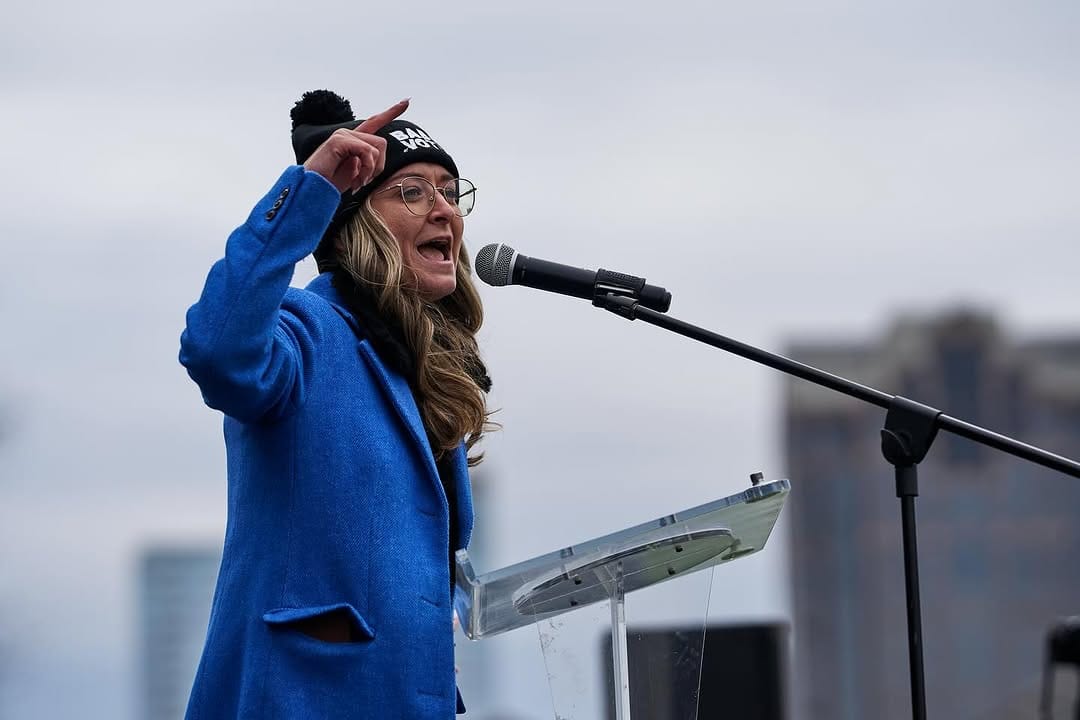
"If no one else is coming to save me, I'm going to pick up the torch."
There is a pervasive line of thought that Democrats don't have guts.
They are outflanked, flummoxed, tepid and cringing, the party of "walk softly and carry a little stick."
That thinking has been especially true in North Carolina, where, since 2010, Democrats have been gerrymandered into political oblivion and, when they do have a shot in big, statewide elections, they muck it up with unforced errors.
Clayton's election as the party leader in 2023, when she was just 25, was meant to be an answer to all of those things.
In politics, there are candidates and there are organizers. Clayton has the big personality of a candidate. Sometimes she seems bigger than the actual candidates she's stumping for, but she thinks and talks like an organizer.
She's 27 now, but still the youngest state political party leader in the United States. More interestingly, though, she might be its most fiery. No elephant in the room goes un-talked about.
She is passionate and punchy, a diminutive, self-described "nerd" who speaks fluently about NC and Southern history, calls both parties "geriatric," is prolific on social media, cusses with abandon, and talks about change that springs not from the top but from the bottom.
"Maybe it's good that we have a lot of people out there right now that are, for the first time, trying to figure out how do I host a protest? How do I do that myself? If no one else is coming to save me, I'm going to pick up the torch."
There are some signs of change under Clayton's leadership.
North Carolina was one of a few bright spots for Democrats in 2024. They won the governor's office and other key Council of State races. They broke Republicans' supermajority in the state legislature, meaning Republicans will have to find a Democrat to vote with them if they want to override any vetos from the Democratic governor.
And, perhaps most importantly for the party, they appear to have held onto a seat on the NC Supreme Court, which gives them a chance of flipping the balance of power there in 2028.
The state's high court is the surest path to stopping partisan gerrymandering. Democrats gerrymandered North Carolina's voting districts for decades, but after Republicans took power in the 2010 elections, they returned the favor. Clayton says Democrats won't have a "fair shot" in local legislative elections and in Congressional races until courts rein in the practice.
Other massive challenges await.
In 2024, the state went to President Trump for a third time. Democrats' support among Black and Brown voters, the backbone of the modern progressive movement, withered. And the party continued to struggle in rural places.
Clayton, who's from rural Roxboro, NC, was elected party chair with the hope that she would reverse the party's decline outside the cities.
That hasn't happened yet, but that's a national problem for Democrats, and blaming Clayton for that would be like singling out one firefighter because they couldn't stop a wildfire.
Then there's the Jefferson Griffin case. If people are worried about America's eggshell democracy, the Griffin case in North Carolina should be what keeps them up at night.
Griffin, a Republican who lost the 2024 state Supreme Court race by 734 votes to Democrat Allison Riggs, is asking the court he ran for, which is dominated by his political party, to overturn his loss.
He says 60,000 votes should be thrown out because NC's election system has incomplete information on them, such as a missing driver's license, although the lack of that information, by law, does not make a person ineligible.
Griffin hasn't proven that any of the 60,000 voters are ineligible, and even fellow Republicans in North Carolina are skeptical of his argument, but several influential Republican justices on the state Supreme Court are listening.
At the center of the maelstrom is Clayton, who through it all has to be a public face for liberals, an organizer for the 2025 municipal elections, and a cheerleader.
She says she's trying to fire up depressed Democrats and get them ready for what's next. People are demoralized, she says, so she tells them about NC Democrats' wins, about Riggs and Jackson and others.
"It is the little shit that keeps me going," Clayton says. "Because I am from a place where you don't ever get a win as a Democrat. And so when I get a little win, I'm like, 'Y'all, we just did something here.'"
Political power, she says, doesn't come from a personality at the top, but from many personalities who share common goals and work together.
Some Democrats haven't connected with people outside of the urban centers, she says, because their candidates showed up once every four years. They had the process backwards, Clayton says. Liberals, if they want to emerge from their political defeat, have to build from the bottom-up, making local public servants into candidates who people can know and identify with.
"We were fighting an election not just between Donald Trump and Kamala Harris," Clayton says. "We were fighting it between Donald Trump, Kamala Harris and the couch, and the couch won out for a lot of people last year. And I'm hoping that Democrats look at the fact that happened and we understand as a party, we have got to go and be more aggressive and making sure that people know how we are helping them in governing."
"I see a different version of our party coming up right now. And I think that over the next 20 years, people are going to see what I see now. And it's going to be like, I'm just waiting, I'm going to be out there. I'm gonna be like, 'I told y'all, I told y'all it was coming.'"
Clayton says there's a change coming to Southern politics, which has, for generations, been defined by conservative party rule.
People are eager for change, she says, even if they haven't yet figured out what they want that change to look like.
The Living South Interview
The following is a transcript of my interview with Anderson Clayton. It has been lightly edited for clarity and space.
The Living South:
I'm talking to you in an interesting moment, I think, for everyone, but for liberals and Democrats, especially.
People are asking: Where are the Democrats who are punching back? You stand out to me as someone who is never pulling your punches.
How do you think about the way people are viewing Democrats right now? Are they doing enough? Are they loud enough? Are they feisty enough?
Anderson Clayton:
I think that I'm getting a lot of the same emails. They're like, where is the party right now? And where are you right now? Where is everything?
I think to the point that you just made, I'm trying to be out there, but I think a lot of people, instead of looking to a state level, are looking up, and I think a lot of people are waiting for it to come from the top down. I'm like, does it need to come from the top down though?
That's what I think our problem the entire last four years of an election cycle was, to be honest with you, is that it came from a top down. We go back in a Democratic Party, (it's) probably what's done us wrong the last decade that we've been involved with politics and that we have been sustainably losing elections across middle America, but also rural America and places where our party maybe used to be the backbone of those populations.
Maybe it's good that it's coming from the bottom up. Maybe it's good that we have a lot of people out there right now that are, for the first time, trying to figure out how do I host a protest? How do I do that myself? If no one else is coming to save me, like I'm going to pick up the torch.
And in so many cases, I'm like, that's what I've needed people to do for a long time. I've needed them to want to get in the fight with me. I think that right now we are in an unprecedented moment where people are honestly, the world is shifting beneath our feet, we are trying to figure out how to respond. And I think a lot of what Democrats are doing right now is taking that time to actually sit there and say we need to be coordinated and we need to figure out how to punch back in a way that is not sporadic, that is not disjointed.
And honestly, it does take time to figure out with everything moving so quickly. What is our response and what does it need to be in an appropriate time?
The Living South:
At the DNC, I thought it was really interesting, the reference to 'the new South.'
That term was used for years in a way that, looking back, you can see as almost mocking because the New South wasn't that different from the Old South. When people were using that term, it was still very racist and tied up in some old dogmatic sort of ways.
What do you mean when you say 'a new South?'
Anderson Clayton:
Yes, it still represented racism. I think, though, it also represented a state that had made progress in terms of education and what it valued, and it valued people.
And I think that is still how I associate that phrase, is, like, how do we make a state better than what it was and better than what people typically do associate with a place like the South, which is a lot of hatred, a lot of racism, and a lot of bigotry. And, to be honest, a little bit of backwards, right?
And I think what I see is when you give people the opportunity to come out of silos and the opportunity to be better educated and have access to something.
I really believe that education is the great equalizer.
You have people like me, who's a state party chair of the Democratic Party in North Carolina, that grew up in Roxboro in rural Person County.
People all the time say, 'How on earth could someone that comes from a place like that end up in a position like this?' And I'm like, it's because I come from a place like that I end up in a position like this at a young age and in the place that I am.
And I think that trying to get more people to understand we can create more and better here than what we have in the past. And that's something to me that's really beautiful because I think I spent my entire life feeling like I needed to leave where I grew up because it didn't think the same way that I did. It didn't believe in the same things that I did. And I felt forced out of it.
And I feel like so many young people that grew up in rural North Carolina or in the rural South are, like, you've got to leave. Like you have to leave this state in order to make something of yourself. You cannot do it here.
And that mentality I think was flipped on its head when we started to have a surge of public education and the Democrats' priority on higher education in the state because it allowed people for the first time to see North Carolina as a place worth staying in.
And I'm like, now we need to have the same resurgence of people saying, 'what's going to make people stay in North Carolina?' And that means feeling like this is a home and a place for everyone, that there is community here across the state.
But I still feel like the concept of it is the same in so many cases, but I see a different version of our party coming up right now. And I think that over the next 20 years, people are going to see what I see now. And it's going to be like, I'm just waiting. I'm going to be out there. I'm gonna be like, 'I told y'all, I told y'all it was coming.'
We saw it from the grass seeds up and it's there. It's just, it maybe isn't what you see right now.
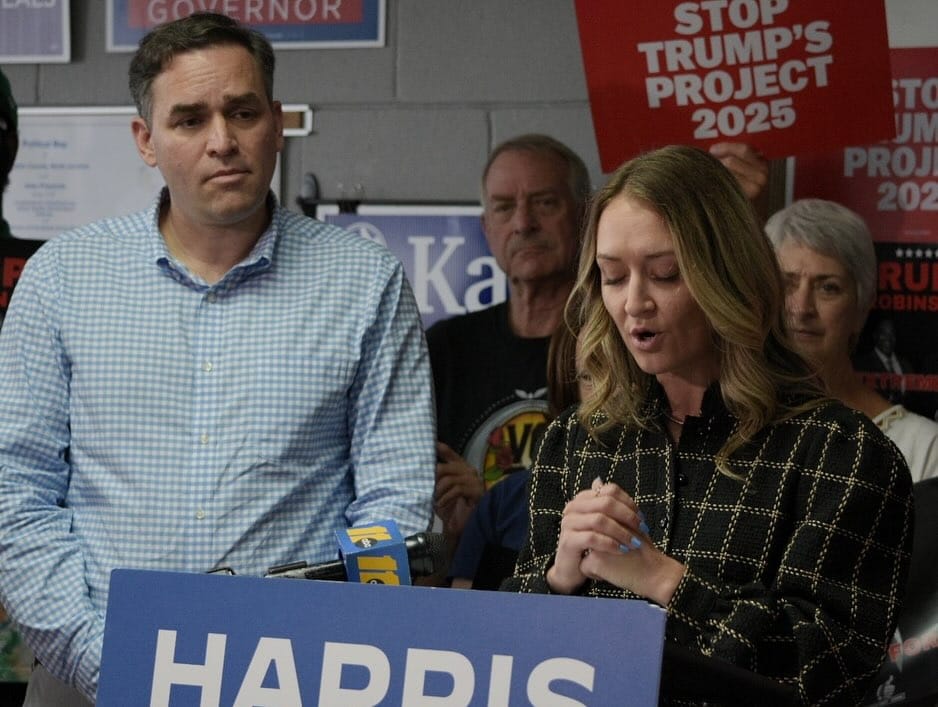
The Living South:
I'm glad you mentioned being from rural North Carolina. What is it people don't get about rural people?
Anderson Clayton:
I don't think Donald Trump, if he got rural people, would be taking away people's health care right now.
Because I think that the number one thing that we care about is each other. And it's what makes rural communities so different. And that's regardless of party affiliation. I grew up in a place where everybody knew somebody to ask for help that was outside of your immediate family. And what I've come to realize through organizing is that those communities exist everywhere.
It's just, it feels a lot different when you feel isolated from everyone else. And I think that is oftentimes how rural communities have felt throughout the state and throughout this country, honestly, is that they're isolated, nobody talks to them.
And when they do, it's about, we're going to cut this and this. And so you need to figure out as a community, how you're going to fund it. And the resources strapped environment that you've been in for so long has caused a community to really have to figure out how to come together and service those in need.
But I just I think what's missing is the opportunity to say like government should be doing that for us in so many cases, and then it shouldn't have to be just communities that fill that gap. Good government works for people and it fills that gap for us, and I think that a lot of people just don't see that right now.
The Living South:
Rural people feel as if party people are only showing up right before the election, that there wasn't an organizing or a presence there consistently.
Anderson Clayton:
To be real, that's why we made such a big case about running people in all of the state legislative districts, because I heard so many people say 'no Democrat even thought I was worth going on the ballot to vote for.'
And we didn't have anybody that represented our values or that felt like our vote was worth fighting for, and we ran a lot of candidates this last cycle and a lot of them were paper candidates. They didn't really campaign. They got out there and they put their name on the piece of paper.
And I had so many people come back to me this year and they were like, 'Anderson, our candidate didn't even get out there and do anything.' And I was like, 'and we've reached phase two, we reached enlightenment.'
If you want to be the one that gets up there and does that and runs a campaign and actually goes out there and talks to people instead of just putting your name on the ballot because it's a gerrymandered district, that would be great.
We're not going to get to a place yet where where I think people fully see our party everywhere until we are able to to eradicate partisan, racial gerrymandering, to be honest with you, like our party is just not going to have a fair shot. And people, I don't think, are going to feel like their votes fundamentally matter in a lot of these areas until they can really see that they do.
The Living South:
If you've gotten so good at gerrymandering, you could almost make some elections irrelevant. This court case with Jefferson Griffin feels like it's just the next step of making elections feel irrelevant for some people.
But North Carolina had a lot of bright spots (for Democrats).
What do you attribute the wins that Democrats were able to pull off in this state? People like Josh Stein, Jeff Jackson and Rachel Hunt, and lots of candidates, Mo Green, who pulled off wins, very close ones, but very important ones.
Anderson Clayton:
Honestly, I think it's candidate quality in every single way. All of those candidates had really good relationships to the state of North Carolina. They had deeply embedded community relationships and people that knew them not just as a Democrat, right? They knew them as a school superintendent, as Mo Green would say, or they knew Rachel Hunt as somebody who had been a volunteer in their community for years and years as a PTA mom, and then also somebody that was just really engaged with trying to make her kids' schools better.
And I think that, a lot of folks really saw themselves in the people that we ran for office.
Jeff Jackson is someone that can communicate like none other. He's someone that doesn't necessarily confront people with, I think, a partisan narrative. It comes across very much 'I'm just telling you how it is, and you can like it or you can hate it, but I want you to know exactly what's going on in your government right now,' and a lot of people crave that authenticity and that honesty.
And, to your point, Mark Robinson did not have coattails, like there have been several research studies done about the fact that, yes, we had a crazy person that ran for governor against Josh Stein that helped us have the largest margin for any Democratic governor in state history by 15 points, right? We'll brag about that one all day long.
But I'm like, we had really successful down ballot wins, I think, because, the candidates that we had were just phenomenal. And Democrats have got a deep bench of good candidates and good people that have run for statewide office and that are running for, honestly, state legislative offices, that are running for county commission and city council and school board right now too.
And the thing that I think Republicans should be most afraid of in our state of Democrats is the fact that we're building a very deep bench.
Over the next 10 and 20 years in the state of North Carolina, they're going to see that bench just keep on coming out with some amazing talent. And people that I genuinely believe folks are going to see as just saying, 'man, they care about public service,' and that is a hard thing to do right now, when a lot of what politics has become is media-centered and television-centered, instead of work centered.
How are you actually impacting somebody's fucking life at the end of the day?
In my opinion, you're going to meet a lot of Democrats that are just good stewards of people's trust. And they want to make sure that they help people at the end of the day, because that is what good government is supposed to do.
And that's what our party fundamentally believes in is good government.
The Living South:
I'm a guy who has been through people being terrible to them online. You, like a lot of women who are in politics, just every time I see you engaging online, the stuff that you're getting back from some people is nasty.
I can't find a better word for it. They talk about how you look, they talk about how you talk.
Usually, it's not something men get. How do you, in this public space, deal with that? How do you keep doing the work and roll past that stuff?
Anderson Clayton:
Most of the time, cause there's more good than bad. And I think that the only things that have been really interesting, I think, are when people like it, it feels threatening to your safety.
Like a lot of the folks that talk to me on Twitter—I still call it Twitter, I will never not—but a lot of the folks that respond to me on Twitter, I do not ignore it because I also want to know, like, where are they?
There was a guy who was a big promoter of the Second Amendment that would always be responding to my post on Twitter, and he lived out in one of my rural counties in the west that I have visited often. Making sure that I know where people are who may not like me, and so that I am also hyper-aware of my surroundings at all point in time.
I think that the thing that I've actually come into contact more with is that people recognize me in public now. I've been in Walmart, I've been in a random Trader Joe's. I don't see myself as somebody that folks would do that to, but I think it has become more and more. I had the former Wake County Republican chair walk up to me in Walmart a few months ago, and was like, 'I know exactly who you are,' and I was just like, 'That's weird!'
Twitter used to be a place that I loved to be on. That app used to be where I would find all my rural organizers, I would engage with people that I just normally wouldn't. And there are a couple of right-wing North Carolina activists on there that have taken a way that you can organize on Twitter through groups and they have populated all of my posts throughout that group. And so like now you get a whole host of folks that just attack it.
And so what I've been trying to do is just tag those folks in vote builder. So I know how they're voting in the next election cycle and trying to use it as an organizing tactic because I don't want us to ever knock those folks' doors.
And I want to make sure that we're not engaging with people that would like to see harm done to any Democrats.
The Living South:
The way that you talk to people is, I think it's authentic, but also, it reminds me somewhat of Jeff Jackson, because he has worked so hard to be positive, which right now is a hard thing to do. Sometimes it's a brutal thing to do.
Anderson Clayton:
I see what happens when you win.
And I think that Jeff Jackson's a great example of it, and I tell this story often right now to all the counties that I go to, because people are demoralized, they really are. Across the state, they're looking for wins everywhere.
I tell them two stories. I tell them Jeff Jackson, I tell them Allison Riggs, because I'm like, you gotta hear both of them in order to be able to understand what we did in North Carolina last election cycle. Our party did not come through for Chief Justice Cheri Beasley in 2020. We needed to, and she lost that election by 401 votes.
We came back and, this election cycle we were able to hold a Supreme Court justice seat by double the margin that we lost one by in 2020.
And that is because every single person in North Carolina, every Democrat I had went out and found another friend, somebody that voted before, somebody that they talked to about Allison Riggs for the first time.
And that is why we are keeping that seat right now, even if Republicans don't want to admit it.
And it makes my rural counties look at it and go, 'Damn, my vote mattered, right?' That one seat alone.
And it's gonna help us when I tell them the story about how we're going to repair partisan and racial gerrymandering and take it away from Republicans again in 2028 when we take back our Supreme Court, because we are on the path to do it and we've done it right.
People feel better and they feel like, 'OK, I made an impact.'
And then I talked about Jeff Jackson, because I'm like, the other thing that I saw happen in November, right? We had all these Democratic wins and Republicans in the legislature passed a Senate bill that took away a lot of the power of some of those wins. And they were trying to just stick us with it.
And coming around to the fact that, in January, they realized, 'Damn, we didn't take away (Jackson's) power to sue the federal government. We just took away his power to sue the state government. And now we got to go pass another bill to try to take away his power to sue the federal government because he's coming down hard on Donald Trump right now in his power as attorney general.'
(Jackson's) helping be the only Democratic attorney general, the only attorney general in the South, that is having a voice for Southern people right now and saying 'we also disagree with trying to end birthright citizenship, by taking away federal money and aid to people right now that need it the most, and that Elon Musk should not be accessing our data.'
No unelected billionaire should be anywhere near our fucking shit, right?
That is what we get to say by having Jeff Jackson in the Attorney General's office. And because we broke a supermajority in November, we're going to get to hold that power.
And Republicans have got to be a little bit angry at themselves, right? That they didn't do everything they should have when they had all the power that they did.
And I think that keeps me alive. It keeps me hopeful. It is very nitty gritty. It is very nerdy type of political energy right there, I think. But it is the little shit that keeps me going. Because I am from a place where you don't ever get a win as a Democrat.
And so when I get a little win, I'm like, 'y'all, we just did something here,' and this should be the energy that we have. That was a fight. They didn't expect us to have that. They didn't expect us to walk back with this Supreme Court or this supermajority break.
That was something we caught them flat-footed for a moment. Let's go catch them again and let's go see if we can't do it one more time. But keeping that energy can be really hard to do.
The Living South:
Honestly, I'm 42 years old, I've been hearing that the political parties can't reach young people since I was young. That young people are not politically engaged or they're not active, or that they just don't care.
What's your response to that?
Anderson Clayton:
The fact is that you're always going to have different demographics and populations of people that are inherently disengaged with politics.
I think that just because young people didn't turn out for Democrats as much as we wanted them to this last election cycle doesn't mean that we give up talking to them. In fact, I think it means that we talk to them more and that we try to make sure that they're the ones that are also in positions of power to run for office.
Young people right now, 60% of young people are more likely to turn out and vote if there's a young person on the ballot, regardless of what political party they're a part of.
And I think that is really important for people to understand. They crave representation and, looking at a party right now, nationally both of them, quite frankly, are geriatric, and it doesn't help us to have the oldest president in history again with Donald Trump, Both political parties, young people still do not see themselves fully represented in them.
And I think this election cycle, people desired change and they didn't really look at where it was coming from or what it, who it would harm when it came. But they, their pocketbooks were hurting.
Young people right now are more likely to not have health insurance, right? They're more likely to have a crisis when trying to find housing right now when they're graduating from college or graduating from high school.
All of the bad shit that they're experiencing. And I think that we need to still engage more with demographics that are hurting. And that doesn't just respond to young people. It's also responding to Black and Brown communities this election cycle. It's responding to young men this election cycle.
And I just think that we've got to talk to people more and listen to people more. Honestly, it doesn't mean that we disengage from any electoral group. The saying goes, 'Everybody is somebody worth talking to.' And I just believe that we got to keep doing it.
The Living South:
And all those voters who might have voted for Biden, but then dropped out for Harris for whatever reason, I think you can look at the numbers and see that it's not like they went out and voted for Trump.
Anderson Clayton:
No, we were fighting an election not just between Donald Trump and Kamala Harris. We were fighting it between Donald Trump, Kamala Harris and couch, and the couch won out for a lot of people last year.
And I'm hoping that Democrats look at the fact that happened and we understand as a party, we have got to go and be more aggressive and making sure that people know how we are helping them in governing.
Because honestly, and honestly, Republicans are hurting them. Like right now we're seeing cuts done to every single public university that we have in the state of North Carolina for federal funding. We're seeing people all over the state in the forest industry, and also in our public works, lose their jobs.
And I think that the opportunity is that we've got to meet those people where they are versus saying, 'We told you. Shouldn't have voted for him to begin with.'
That's the number one thing that I would think that anybody should not be doing right now. Nobody is ever going to win an election by calling people stupid.
The Living South:
That's a tough sell for anybody.
One more question. Who's your hero, Anderson?
Anderson Clayton:
Oh gosh, there's so many of them.
I love AOC. I think that, in any single way, shape, or form, whatever you think about her politics, the way that she communicates and articulates with people. I also am a huge fan of Maxwell Frost.
Here, locally, though, Lindsey Prather is amazing, and somebody that won an R+3 district this year and just, I don't think enough people give her that amount of credit.
Beth Helfrich is someone that is newly elected into our state legislature. Phenomenal. And really speaks from a place of knowing her constituents and wanting to learn about just every side of an issue. And I think that's rare in politics.
And then looking at the local level, you've got people like Chris Suggs, who I think is just a phenomenal public servant in Kinston and Lenoir County.
And then you have people like a Zeb Smathers in Canton that I think is just doing phenomenal work to represent his home state and his home county.
The Living South:
You were like, I can't name one. Then you named eight.
It says something that these are such hyperlocal people. We talk about this in journalism all the time about hyperlocal, and how we're missing it in so many ways and we have to do better. Journalism is not the same thing as political organizing, but I think there's a lot of overlap here.
Anderson Clayton:
My job as a state party chair, I always try to tell people, because people keep talking about the messenger, they're like, 'who's leading the party right now?'
And I'm like, 'who do you think leads the party?' Because I was like, 'I can name you 50. And they would be nobody that somebody, if you asked them and pulled them off the street, who is leading the Democratic Party right now would say is.
But I think that is also like, how do people look at the party? And who do they look to lead the party? Because it's also your own internal interpretation of that. People have so much (more) power than we think that we do. We let media dictate a lot of what happens. Our power is remarkable when we're like, 'wow, actually we could shape who the party is.'
We could shape who the leaders of it are. I don't know, Billy Ball. It's a wild concept to have, but I'm trying to get more people in that sort of framework. You are the party.

